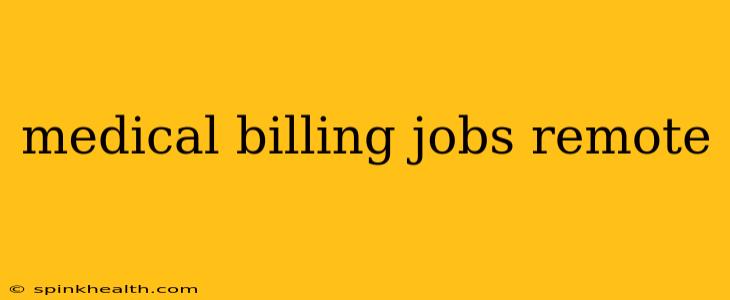Unlocking Flexibility: Your Guide to Remote Medical Billing Jobs
The hum of the office, the constant chatter of colleagues – for many, the traditional workplace is a thing of the past. The rise of remote work has revolutionized numerous industries, and healthcare is no exception. More and more medical billing professionals are discovering the freedom and flexibility of remote medical billing jobs. But what does it take to land one of these coveted positions? Let's dive in.
What are the typical duties of a remote medical billing specialist?
A remote medical billing specialist performs essentially the same duties as their on-site counterparts. Think of it as the same job, but from the comfort of your home office. This includes:
- Entering and processing patient claims: This involves meticulously ensuring accuracy in patient information, procedure codes, and diagnoses. A single error can delay payment, so precision is paramount.
- Following up on unpaid claims: This often involves communicating with insurance companies to resolve denials and ensure timely reimbursement. Excellent communication and problem-solving skills are essential here.
- Managing patient accounts: This includes handling inquiries, updating patient information, and resolving billing discrepancies. Strong organizational skills are crucial to keep everything running smoothly.
- Maintaining accurate records: Regulatory compliance is vital in medical billing. This means adhering to HIPAA regulations and maintaining detailed, well-organized records.
- Using billing software: Proficiency in various billing software systems is a must, and familiarity with Electronic Health Records (EHR) systems is often beneficial.
What skills are necessary for a successful remote medical billing career?
Beyond the technical skills, certain soft skills are crucial for success in a remote medical billing role:
- Strong communication skills: You'll be interacting with insurance companies, patients, and potentially other healthcare providers, often remotely. Clear, professional communication is essential.
- Problem-solving abilities: Claims denials and billing errors are inevitable. The ability to quickly identify and resolve these issues is key.
- Attention to detail: Accuracy is non-negotiable in medical billing. Even small errors can have significant consequences.
- Time management skills: Working remotely requires excellent self-discipline and the ability to manage your time effectively.
- Technological proficiency: You'll need to be comfortable using computers, various software programs, and communication tools.
How do I find remote medical billing jobs?
The hunt for a remote medical billing job often requires a multi-pronged approach:
- Online job boards: Sites like Indeed, LinkedIn, and Monster often list remote medical billing positions. Be sure to specify "remote" in your search criteria.
- Company websites: Many healthcare organizations are increasingly offering remote positions. Check the career pages of hospitals, clinics, and medical billing companies directly.
- Networking: Connect with other medical billing professionals on LinkedIn and attend virtual industry events. Networking can lead to invaluable job leads.
What certifications or education are typically required for remote medical billing jobs?
While specific requirements vary, most employers prefer candidates with:
- A high school diploma or equivalent: This is a minimum requirement for most entry-level positions.
- Medical billing and coding certifications: Certifications like the Certified Professional Coder (CPC) or Certified Billing and Coding Specialist (CBCS) demonstrate expertise and can significantly increase your chances of landing a job. These often require additional coursework.
- Associate's or Bachelor's degree: While not always mandatory, a degree in healthcare administration or a related field can provide a competitive edge.
Are there any downsides to working remotely in medical billing?
While remote medical billing offers many advantages, it’s important to acknowledge potential drawbacks:
- Isolation: Working from home can sometimes lead to feelings of isolation. Active efforts to maintain connections with colleagues and engage in social activities are essential.
- Technology dependence: Reliable internet access and computer equipment are crucial. Technical difficulties can disrupt workflow and impact productivity.
- Home office setup: Creating a comfortable and efficient workspace at home requires investment and careful planning.
The allure of a remote medical billing job is undeniable – the flexibility, autonomy, and work-life balance it offers are significant draws. By developing the necessary skills, leveraging online resources, and networking effectively, you can successfully navigate this exciting career path and find the perfect remote role that suits your needs.

